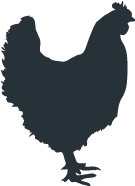Gout is a form of inflammatory arthritis which involves the formation of deposits (tophi) in joints, on tendons, and in the surrounding tissues. It is caused by overproduction or under-excretion of uric acid.
Chickens with impaired renal function may not be able to get rid of uric acid as efficiently. This can lead to an accumulation of uric acid within the blood, resulting in a condition referred to as hyperuricemia.
Hyperuricemia can cause uric acid deposits to form within the joints (articular gout) and in visceral organs or other extra-visceral sites (visceral gout). These deposits can grow to form tophi (nodular masses of uric acid crystals). Over time, it can lead to erosion of bone in affected joints.
What are the Different Forms of Gout?
- Articular Gout: The accumulation of urates within the synovial capsules and tendon sheaths of the joints, including the toes of the feet.
- Visceral Gout: The precipitation of uric acid crystals along the surface of internal visceral organs and other sites within the body.
Articular Gout Versus Visceral Gout
| VISCERAL GOUT | ARTICULAR GOUT |
|---|
| Typical Onset: | Acute | Chronic |
| Prevalence: | Common | Sporadic |
| Gender: | Both | Mostly roosters |
| Percent of flock affected: | Can be up to 100% of the flock | Individual birds |
| Gross lesions observed in organs after death |
| Kidneys: | Almost always involved. Abnormally sized and covered w/ white chalky deposits | May become involved. Usually appears normal unless the bird was dehydrated. |
| Joints: | May or may not be involved | Always, especially the feet |
| Possible causes: | Dehydration
Sodium bicarbonate
Infectious agents
Vitamin A deficiency
Secondary to urolithiasis
Neoplasia
Immune mediated glomerulonephritis
Exposure to toxic substances | High protein diet
Excess dietary calcium in diet
Low-phosphorus diet
High energy diet
Genetic defect
Mycotoxins |
What Causes Gout?
Goat is caused by kidney damage or malnutrition, often related to the following factors:
Diet-Related Risk Factors:- Excess dietary calcium: Feeding non-laying chickens (such as chicks, pullets, roosters, and non-laying hens) a high calcium diet for an extended period of time can cause kidney damage. This is most commonly related to feeding all flock members commercial laying hen feed. It can also be caused by a feed mill error, feeding an abundance of table scraps or treats that contain high amounts of calcium, and by providing low-quality poultry feed that contains large particles of calcium carbonate (CaCO3).
- High protein diet: When chickens are fed protein in excess of their nutritional requirements, the additional protein is converted into uric acid. This puts them at a higher risk of developing gout.
- Vitamin A deficiency: Vitamin A is an essential vitamin for chickens, and if they are receiving a vitamin A-deficient diet for any length of time, it can cause damage to the lining of the ureters (the ducts by which urine passes from the kidneys to the cloaca), leading to gout. Not all commercial chicken feeds contain vitamin A, and in those that do, the amount degrades over time, especially when it is exposed to sunlight. This is because vitamin A is very sensitive to sunlight. Chickens that do not have regular access to pasture grass are at a high risk of vitamin A deficiency, as grasses and various weeds (such as dandelion) are a good source.
- Low-Phosphorus diet: Chickens receiving a diet low in phosphorus are more at risk of developing gout, as phosphorus acts as a urine acidifier which helps prevent kidney stones.
- High cholesterol diet: Chickens fed a high cholesterol diet are more prone to developing renal disease.
Management-related- Dehydration: If chickens become dehydrated, this puts them at risk of kidney damage. Dehydration is usually caused by lack of water, which most often is a risk during hot weather with increased water intake or during cold weather from lack of water access due to the formation of ice along the surface of the water source.
Viral infectionsToxins - Mycotoxins: Mycotoxins are toxins produced by molds that are commonly found in commercial poultry feeds worldwide, in addition to bedding materials, and other feedstuff. Ingestion of certain types of mycotoxins are known to cause kidney damage.
- Aminoglycoside Antibiotics: Aminoglycosides (Amikacin, Tobramycin, Gentamicin) have nephrotoxic side effects.
- Disinfectants and insecticides: Are safe and effective when used properly in accordance to manufacturer recommendations, however they can cause kidney damage when the dosage is miscalculated.
- Sodium bicarbonate (baking soda): Giving chickens sodium bicarbonate (which is sometimes administered during periods of hot weather and/or to improve egg shell quality) can contribute to the onset of gout by disrupting the pH, making it more alkaline, and putting chickens more at risk of kidney stones.
